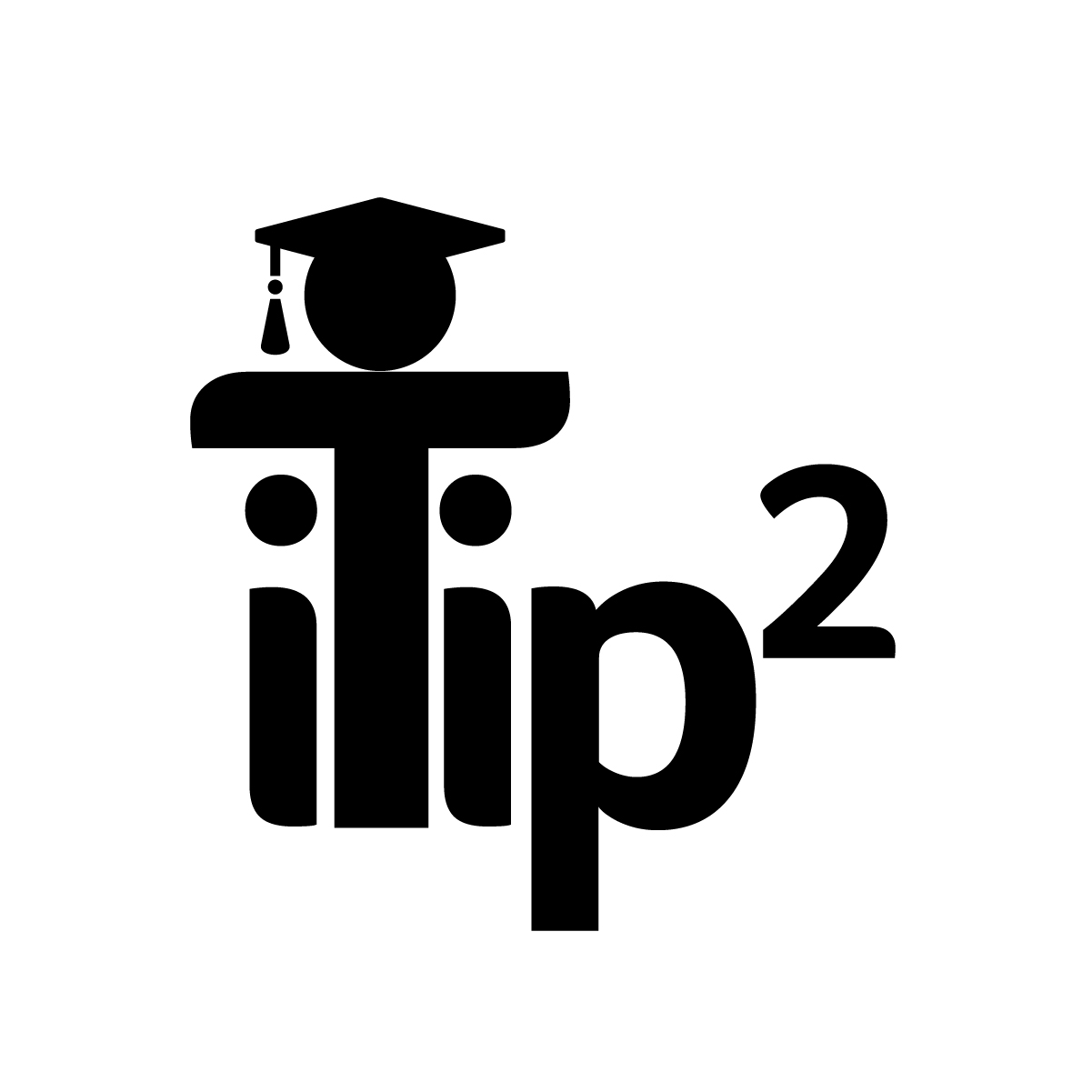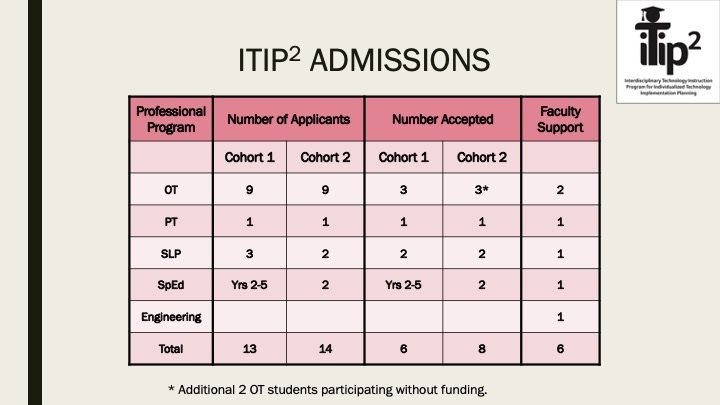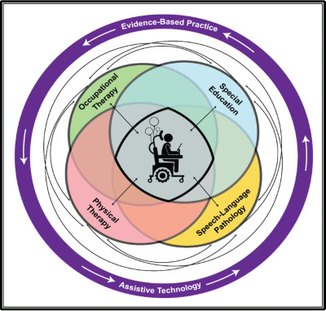Overview

This project prepares new special education and related services personnel for employment in the field of special education. The project will train them to work effectively on teams selecting and implementing the full spectrum of AT devices and services. The project focuses on intervention for individuals, ages 3-21, in urban, suburban, and rural areas of Wisconsin. It is designed to prepare special education and related service personnel to deploy the power of AT and universal design through team-based differentiated instruction and intensive individualized practices.
Background
Federal legislation (i.e., IDEA) mandates that members of individualized education program teams consider assistive technology (AT) when planning to meet the needs of each student with a disability in public school. However, there is little evidence that all students who need AT have access to appropriate devices and services. [1,2] Systematic research efforts document the supply and demand needs for AT expertise in schools. [3] This research complements national snapshots that paint a patchy picture of the status of preparation efforts directed at teachers and related service personnel capable of maximizing the potential of AT and instructional technology for students with disabilities. [4-7] Indeed, a recent survey of AT service providers underscores the need for interdisciplinary training to support effective service coordination and outcomes measurement. [8] While we are charged to consider AT interventions, the level of competence among the workforce, both real and perceived, is tenuous. Thus, there is a critical need for research-oriented practitioners who understand and can collaborate effectively to implement evidence-based practices (EBPs) for students with disabilities.
Developed in part under a grant from the U.S. Department of Education’s Office of Special Education Programs and facilitated by the recent CAAHEP/CoA-RATE accreditation of the University of Wisconsin – Milwaukee’s Assistive Technology and Accessible Design Certificate (ATAD Certificate), the Interdisciplinary technology instruction program for individualized technology implementation planning (ITIP2) Program launched in January 2019.
Objectives
The purpose of the ITIP2 program is to foster the interprofessional development of an innovative personnel preparation program utilizing EBPs to address the shortage of highly qualified special education and related service personnel specially trained to implement technology interventions (AT, instructional technology) and Universal Design for Learning (UDL) for the school-age population.

Methods
Design: The ITIP2 design creates a program including interdisciplinary coursework, assignments and interprofessional education for preprofessional students in special education and related fields providing assistive technology. It was further designed to infuse evidence-based practice with coordinated clinical experience and a collaborative interdisciplinary capstone project or thesis. The UWM is uniquely positioned to implement these course design elements since we have the CAAHEP accredited ATAD certificate in place already designating much of the coursework needed.
Program of Study: The program of study required collaboration between and within 4 professional graduate programs. The curriculum was designed to ensure that students would take a key set of foundational and advanced coursework both within their own graduate curriculum and together overlapping coursework in key assistive technology and research coursework. Additionally, students attend 2 seminars per semester and 2 assistive technology conferences during their program.
Challenges and Opportunities: The most significant challenge was overlapping curriculum to ensure interprofessional education including shared coursework and field experiences. While we were unable to ensure that all four professions were in coursework and the field together as a cohort, we were able to ensure that students from at least two professions are in key courses together.
A second challenge will be creating overlapping and shared evidence-based practice research project or thesis.
The primary opportunity is facilitating IPE within our colleges and departments. IPE is a quickly developing strategy in facilitating interprofessional practice once in the workforce.

Impact
Over the five years of funding of the ITIP2 project, 42 students will graduate with interprofessional and advanced AT education complimenting their disciplinary training. It is our hope that this program will become an example of the possibility of IPE and how it can facilitate improved outcomes for students and other clients receiving AT services from AT professionals in schools.
Team
The team includes the following faculty members:
- Roger O. Smith, PhD, OT, FAOTA, RESNA Fellow
- Michelle Kaye Silverman, MS, OTR, ATP
- Sara Jozwik, PhD
- Shelley Lund, PhD, CCC-SLP
- Victoria Morechen, PT, PhD
Related News and Stories
• https://uwm.edu/news/occupational-therapy-students-get-some-seats-on-experience/
• https://www.nsmletsgetmoving.com/client-stories/leah/
Project Bibliography
Publications and Proceedings
2019
Silverman, M.K., Jozwik, S., Lund, S., Moerchen, V., Smith, R. O. (June, 2019) ITIP2: Interdisciplinary technology instruction program for individualized technology implementation planning. Poster presentation at the 2019 RESNA/RehabWeek conference, Toronto, Canada. RESNA 2019 conference abstracts, Assistive Technology, 31:5, 231-250, DOI: 10.1080/10400435.2019.1682374
Silverman, M. K., Jozwik, S., Lund, S. K., Moerchen, V. A., Smith, R. O., (2019). ITIP2: Interdisciplinary technology instruction program for individualized technology implementation planning. RESNA/RehabWeek Conference, Toronto, Canada. https://www.resna.org/sites/default/files/conference/2019/outcomes/Silverman.html#:~:text=The%20ITIP2%20program%20was%20designed,related%20fields%20providing%20assistive%20technology.
Silverman, M. K., Smith, R. O. (2019). Lessons Learned From an Early Adopter of Assistive Technology Program Accreditation. American Occupational Therapy Association Annual Conference & Expo, New Orleans, LA.
2018
Silverman, M.K., Smith, R.O. (2018) CoA RATE accreditation process: a case report from the program perspective. Paper presented at the Rehabilitation Engineering Assistive Technology Society of North America Conference (RESNA), Arlington, VA. Retrieved from https://www.resna.org/sites/default/files/conference/2018/public_policy/Silverman.html
Silverman, M. K., Smith, R. O. (2018). CoA RATE accreditation process: a case report from the program perspective. Rehabilitation Engineering Assistive Technology Society of North America Conference (RESNA), Arlington, VA. https://www.resna.org/sites/default/files/conference/2018/public_policy/Silverman.html
Silverman, M. K. (Presenter & Author), Smith, R. O. (Author Only). (2018). Assistive Technology Industry Association, “Updates in Assistive Technology Accreditation and Certification: What you need to know!,” Assistive Technology Industry Association, Orlando, Florida.
Presentations
Silverman, M. K. (Presenter & Author). (2018). Statewide School Based OT/PT Conference, “Introduction to Assisitve Technology,” CESA #1, Wisconsin Dells, WI.
Silverman, M.K., Smith, R.O. (2018) CoA RATE accreditation process: a case report from the program perspective. Paper presented at the Rehabilitation Engineering Assistive Technology Society of North America Conference (RESNA), Arlington, VA. Retrieved from https://www.resna.org/sites/default/files/conference/2018/public_policy/Silverman.html
Silverman, M. K., Smith, R. O. (2018). CoA RATE accreditation process: a case report from the program perspective. Rehabilitation Engineering Assistive Technology Society of North America Conference (RESNA), Arlington, VA. https://www.resna.org/sites/default/files/conference/2018/public_policy/Silverman.html
Silverman, M. K. (Presenter & Author), Smith, R. O. (Author Only). (2018). Assistive Technology Industry Association, “Updates in Assistive Technology Accreditation and Certification: What you need to know!,” Assistive Technology Industry Association, Orlando, Florida.
Silverman, M.K., Jozwik, S., Lund, S., Moerchen, V., Smith, R. O. (June, 2019) ITIP2: Interdisciplinary technology instruction program for individualized technology implementation planning. Poster presentation at the 2019 RESNA/RehabWeek conference, Toronto, Canada. RESNA 2019 conference abstracts, Assistive Technology, 31:5, 231-250, DOI: 10.1080/10400435.2019.1682374
Silverman, M. K., Jozwik, S., Lund, S. K., Moerchen, V. A., Smith, R. O., (2019). ITIP2: Interdisciplinary technology instruction program for individualized technology implementation planning. RESNA/RehabWeek Conference, Toronto, Canada. https://www.resna.org/sites/default/files/conference/2019/outcomes/Silverman.html
Silverman, M. K., Smith, R. O. (2019). Lessons Learned From an Early Adopter of Assistive Technology Program Accreditation. American Occupational Therapy Association Annual Conference & Expo, New Orleans, LA.
Related Readings
Arthanat, S., Elsaesser, L., & Bauer, S. (2017). A survey of assistive technology service providers in the USA. Disability and Rehabilitation. Assistive Technology, 12(8), 789-800. https://pubmed.ncbi.nlm.nih.gov/28125297/
Bausch, Margaret E., & Hasselbring, Ted S. (2004). Assistive Technology: Are the Necessary Skills and Knowledge Being Developed at the Preservice and Inservice Levels? Teacher Education and Special Education, 27(2), 97-104. https://www.researchgate.net/publication/249840439_Assistive_Technology_Are_the_Necessary_Skills_and_Knowledge_Being_Developed_at_the_Preservice_and_Inservice_Levels
Edyburn, D. (2013). Critical Issues in Advancing the Special Education Technology Evidence Base. Exceptional Children, 80(1), 7-24.D. L. https://journals.sagepub.com/doi/abs/10.1177/001440291308000107?journalCode=ecxc
Edyburn, D. (2015). Efficacy of Assistive Technology Interventions (First ed., Advances in special education technology ; v. 1). Bingley, UK: Emerald Group Publishing Limited. https://searchworks.stanford.edu/view/13345581
Quinn, B., Behrmann, M., Mastropieri, M., Chung, Y., Bausch, M., & Ault, M. (2009). Who is Using Assistive Technology in Schools? Journal of Special Education Technology, 24(1), 1-13. https://journals.sagepub.com/doi/10.1177/016264340902400101
Rao, K., Ok, M., & Bryant, B. (2014). A Review of Research on Universal Design Educational Models. Remedial and Special Education, 35(3), 153-166. https://journals.sagepub.com/doi/abs/10.1177/0741932513518980